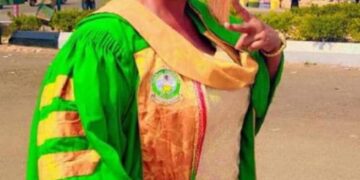[ad_1]
By Taiwo Amodu
Last month, the Kano State Governor, Dr Umar AbdullahiGanduje, inaugurated a high-powered committee to organise a conference that will examine the contentious issues around the herders/farmers conflict.
The 27 member Committee which has former Chairman of the Independent National Electoral Commission (INEC), Professor AtahiruJega, as head of the team, was saddled with the responsibility to convene a national conference with the theme, “Livestock Reforms and Mitigation of Associated Conflicts in Nigeria”, make recommendations in its report for appropriate action towards finding lasting solution to the debacle.
Apart from Professor Jega, other members of his trouble shooting team included, thePro-Chancellor, Yusuf MaitamaSule University, ProfessorJibrilaDahiru Amin; and former SSG, Niger State and Professor of Veterinary Medicine, University of Ibadan; Prof. Muhammad YahayaKuta among others.
Responding, after the inauguration of his team by Governor Ganduje at the Kano State Governor’s Lodge, Asokoro, Abuja, Jega said the herder-farmer clash was a very serious issue of national concern.
He said:” Politics seems to create misunderstanding which affects rational deliberations on how to address such important national issue. But a conversation on this devoid of politics would help drive reforms on this very important issue.”
He said the proposed conference promised to bring together a range of stakeholders for cross fertilization of ideas with regards to how to reform the livestock sector in Nigeria for significant value addition to the economy of Nigeria.
“The primary objective of the conference is to bring together a range of stakeholders for cross fertilization of ideas with regards to how to reform the livestock sector in Nigeria for significant value addition to the economy of Nigeria and also how to ensure that such reforms are sustainable, and they also promote social cohesion rather than conflicts which have bedeviled the livestock production sector and discount with the traditional practices associated with livestock development in this country has been conflict riddling and it is very, very important that we find permanent solutions in terms of mitigating those conflicts, and indeed, having sustainable ways of not only developing the livestock sector, but actually preventing, if not totally eliminated, such conflicts.”
For two days last week, Professor Jega assembled researchers, government officials, traditional rulers among others, at the Nigerian Air Force Conference centre in Abuja for the discussion to develop a blueprint and come up with solutions to the perennial herders- farmers’ conflict.
In attendance at the opening ceremony were Kano State Governor and Chief organiser of the event, Abdullahi Umar Ganduje; Sultan of Sokoto, MuhammaduSa’adAbubakar; Dr Mansur Muhtar, Vice -President, Islamic Development Bank and a host of other speakers.
Setting the tone of the discourse, Professor Jega in his opening remarks maintained that the agenda of the conference was “to generate ideas that would contribute to addressing an acute national problem: the relative underdevelopment of the Nigerian Livestock sector and the perpetual crises and conflicts associated with it.”
Jega who acknowledged that the farmers -herders conflict has since become an acute national malaise, appealed to speakers to come up with “impassioned deliberations with viable recommendations, which can be taken further to develop a Blueprint for implementable programs and projects for sustainable Livestock reforms and mitigating associated conflicts in Nigeria.”
The Sultan of Sokoto in his presentation expressed concern over the mutual ethnic distrust in the country which he noted has made it difficult for Nigerians to take dispassionate, non-partisan stance on the discourse of herders-farmers conflict which ultimately has made the impasse to fester without solutions.
He called on participants at the conference to seek to be different in order to secure lasting solutions.
He said: “I have been to Benue at least two times as Sultan to sit with the governors and traditional rulers to discuss peace in the Benue valley. At the end of it, the suggestions, we threw them away. Nothing is done and we are back to square one.
“Let this conference not be in the same manner, let’s do it and let’s do it well and now.”
Governor Ganduje in his presentation advocated ranching as the best panacea to the crisis which he regretted has since taken religious and ethnic dimension.
The Kano state governor appealed to his colleagues in the forum of 36 state governors, the Nigeria Governors Forum to adopt ranching which he said has firmly taken root in his state.
He said: “The Rural Grazing Areas (RUGA) or ranching, which has been deliberately politicized, remains the only option that would go a long way in mitigating existential problems, as pastoralists would have lands to graze without cattle encroaching on people’s farmlands. Because, herders need fodder for their cattle and promoting alternative means of producing feedstock, which reduces the need for grazing land.
“We have gone far in the establishment of Ruga Settlement in Kano. Already, 25 housing units out of the projected 500, situated on 4, 413 hectares of land at Dansoshiya Forest in Kiru local government have been completed and handed over to the herders. Replica of the houses will be displayed during an exhibition planned as part of this conference.
“Modernising the livestock sector is not only key to resolving the herder-farmer conflict, but was envisaged that this economic investment pillar will support and strengthen the development of market-driven ranches for improved livestock production through breed improvement and pasture production.
There is therefore the need for aiding information, education and strategic communication on the development of grazing reserves to mitigate the consequences of these conflicts.
“It is also very important that we must also avoid the dangers of allowing these conflicts to harden to religious or ethnic conflicts. This is the responsibility of political, religious and all other parts our leadership elite in Nigeria.
“We must also intensify existing collaboration with our neighbours especially border communities, to prevent the movement of small arms, and disarming armed pastoralists and bandits who go through our borders day after day.
“Predominantly nomadic pastoralists should be persuaded to move their cattle into established ranches and public grazing reserves, where breeding farms and other mechanized livestock management practices would bolster the sector’s productivity.
“Hand in hand with this, government should rebuild social capital at the community level to promote mutual trust, confidence building, and consolidate the peace process, while the law and order pillar would support the strengthening of legal frameworks for improving livestock production, peace and harmony.
“It is my hope that this conference will produce a working document that would go a long way in mitigating conflicts between herders and farmers in this country.”
Dr Muhtar urged all Nigerians to take more than passing interest in the crisis which he said has claimed over 4000 Nigerians as casualties since 2016 and turned many others into destitute in Internally Displaced Camps.
While he said the conflict is spreading to other regions he raised the alarm that the North appears most hit, affecting health, socio- economic life of the people and threatening education of the young population.
“Conflicts between farmers and herders/pastoralists have been an issue of national concern in recent years. Perhaps the most significant issue of concern is the growing number of casualties associated with it. Between 2016 and now, at least 4000 people lost their lives in these conflicts, with several thousand others sustaining injuries, both physical and emotional. While fatalities were initially confined to the north central, they have since spread across the country increasing pre-existing religious and ethnic tensions.
“In addition to the unfortunate loss of lives, this conflict has often been manifested by an increasing number of internally displaced persons, leading to the breakdown of family units, the bedrock of our society, and disruption in education, especially for young girls. This crisis has also undermined agricultural production compromising our nation’s food security, especially during these periods of rising food prices “Northern parts of Nigeria have been the epicentre of this conflict, although this is spreading to other regions. In the context, given the relatively poor performance of the region, in terms of education, health and other human development indicators, this situation is untenable and threatens the future of our young, growing, and promising population.
“Equally important is the security challenges caused by the conflict. With the passage of every single day that this crisis goes unresolved, our already fragile national security is further threatened. We cannot continue like this.”
The President of the Islamic Development Bank who attributed the conflict to drift of the pastoralists to climate change and Nigeria’s rapidly growing population which intensifies the need for the food and livestock produced by farmers and herders and the ECOWAS Trans-human protocol, to which Nigeria is a signatory.
Migration into the country by pastoralists in the sub-region, he admitted has compounded the nation security challenge.
“This protocol guarantees the free movement of pastoralists and herders across the sub-region. While having positive aspects, it has also contributed to the increased pressure on land, water, and pasture. Besides, there is some evidence of these migrant herders engaging in international arms trade further worsening these issues.”
Will the resolutions guarantee peace?
At the end of the two day summit, discussants agreed on the need for the establishment of Ministry of Livestock Resources.
The resolutions was on the heels of observations by speakers that the Livestock sector has been poorly underfunded.
They observed that the Nigerian livestock sector with a population of about 20.8 million cattle is worthmore than N33 trillion constituting 7% of the total Agricultural GDP with the potential for making enormous contributions to livelihood and overall national economicdevelopment.
“The sector also contributes through the provision of raw materials todiverse industries,utilisation of agricultural wastes, provision of nutrition,enhancement of food security and employment generation, and also assisting in fertility maintenance, among other benefits.
“The indigenous breed of cattle in Nigeria possesses one of the most nutritious and high-quality natural milk. Additionally, Nigeria and other West, African countries have the highest cattle genetic resources in the World with potentials for high value export of beef and associated livestock products such as hides.”
The communique expressed regret that pastoral production system is characterized by low productivity, inadequateapplication of technology and insufficient skills to meet the national demand for milk,meat and other livestock products, necessitating the quest to transform the productionsystem for greater national development.”
Having identified population expansion, land degradation, climate change and associated challenges, leading to degradation of key agricultural and pastoral resources thereby affectingproductivity and livelihoods with serious negative consequences on the rural economy, “the Conference underscores the importance of engagements, dialogues, mediationand community-based interactions in addressing disputes and conflicts among farmersand herders communities in the country.”
ALSO READ FROM NIGERIAN TRIBUNE
[ad_2]






